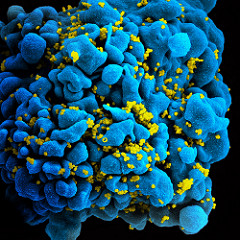Can gene editing drive out HIV and hepatitis viruses from inside cells?
By Cormac Sheridan,
Nature Biotechnology
| 10. 30. 2023
A gene-editing therapy based on CRISPR–Cas9 designed to eliminate HIV-1 infection has rekindled hopes among scientists that it may be possible to eradicate the virus and cure the infection. In an in vivo editing study in non-human primates conducted by scientists from Temple University and Excision BioTherapeutics, a single dose of a CRIPSR therapy excised the simian immunodeficiency virus (closely related to HIV-1) from the DNA of infected animals with no observable off-target effects or other safety problems. The equivalent human therapy, EBT-101, is undergoing a phase 1/2 clinical trial in people infected with HIV-1.
This CRISPR therapy is part of a wave of sophisticated genetic approaches targeting difficult-to-treat chronic infections (Table 1). In addition to gene editing, therapies, including antisense oligonucleotides, short interfering RNA (siRNA), gene therapy, therapeutic vaccines and chimeric antigen receptor (CAR)-T cell therapies, are being brought to bear on a range of pathogens, but most prominently on HIV-1 and chronic hepatitis B virus (HBV) infection.
Once a person is infected and after the acute stage resolves, these viruses can persist indefinitely — in CD4 T...
Related Articles
By Diaa Hadid and Shweta Desai, NPR | 01.29.2026
MUMBRA, India — The afternoon sun shines on the woman in a commuter-town café, highlighting her almond-shaped eyes and pale skin, a look often sought after by couples who need an egg to have a baby.
"I have good eggs,"...
By George Janes, BioNews | 01.12.2026
A heart attack patient has become the first person to be treated in a clinical trial of an experimental gene therapy, which aims to strengthen blood vessels after coronary bypass surgery.
Coronary artery bypass surgery is performed to treat...
By Staff, ScienceDaily | 01.05.2026
Scientists at UNSW Sydney have developed a new form of CRISPR technology that could make gene therapy safer while also resolving a decades-long debate about how genes are switched off. The research shows that small chemical markers attached to DNA
...
Following a long-standing CGS tradition, we present a selection of our favorite Biopolitical Times posts of the past year.
In 2025, we published up to four posts every month, written by 12 authors (staff, consultants and allies), some in collaboration and one simply credited to CGS.
These titles are presented in chronological order, except for three In Memoriam notices, which follow. Many more posts that are worth your time can be found in the archive. Scroll down and “VIEW...




